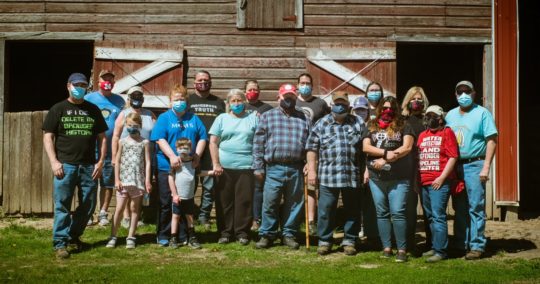Earlier this month, I went to Washington, DC with 11 other fellow Nebraskans, including 4 members of the Nebraska Farmers Union. We went to our nation’s capitol to ensure our members of Congress, the EPA and the Department of State clearly heard our concerns on TransCanada’s Keystone XL Pipeline Project.
One of the reasons I’m active with the Farmers Union is because we are empowered by our membership. Members create and modify our policy in a grassroots fashion. Last December, Nebraska Farmers Union members spoke loudly during the policy portion of our State Convention and added policy language that would protect the landowner’s rights, economic self-interests and the environment from issues that may arrive from existing and future pipelines.
I also felt the Keystone XL issue was bigger than just Nebraska. The Ogallala Aquifer supplies 2 million Americans with drinking water and 27% of America’s irrigation water. What’s more, this will not be the last pipeline built in our state. All landowners deserve basics protections in place from large corporations that many times do not have the farmers’ best concerns in mind. It was because of these issues that I presented our Nebraska policy to the National Farmers Union Delegation.
The National Farmers Union, which represents farmers and ranchers nationwide with 32 state affiliates, adopted the Nebraska-based policy opposing any project that threatens water supplies and condemning the use of unfair tactics to secure right-of-way from farmers and other landowners at our national convention in San Antonio on March 15.
The new policy says, “We oppose any infrastructure or resource development that jeopardizes the health, safety and quality of the Ogallala Aquifer and other freshwater resources.” It opposes “the use of eminent domain without the developer putting into place environmental safeguards and assuming liability for damages,” and calls for “transparency in the planning and routing process including public input, fair compensation to landowners, and a process to deal with landowner and public complaints and conflicts.”
Along the route, landowners and lawmakers are decrying TransCanada’s bullying and aggressive use of eminent domain to push the pipeline through. Farmers in Oklahoma and other states have taken TransCanada to court on grounds that as a foreign corporation it can’t take right-of-way under eminent domain until the State Dept. has granted TransCanada a Presidential Permit allowing the pipeline to cross the Canadian/US border.
Now, the latest conflict is uncovered public transcripts out of a report from the Canadian Energy Board in which TransCanada admits that to build this pipeline project to Texas refineries (instead of Midwestern refineries), price increases for Midwesterners would be likely. That means a new $2.5 billion expense for farmers and ranchers and increased food prices for everyone.
I am sincerely grateful for all of our meetings with the Nebraska Congressional Delegation, the EPA and the State Dept. Within one week of our meetings, concerned Nebraskans received good news: an additional Environmental Impact Statement (EIS) that may answer critical questions about the Keystone XL will be written and published for public comment. That kind of turnaround is unusual and amazing.
While we wait for the new EIS, we are now focused on encouraging our state elected officials to act on state-based regulations and routing concerns to protect Nebraskans now and in the future. I hope this policy coupled with the many concerns Nebraskans have expressed will compel our leaders to ACT NOW.
Action:
Contact your state senator and ask them put pressure on the Natural Resources Committee to push the oil pipeline protection bills out of committee and to the floor for a full vote.



